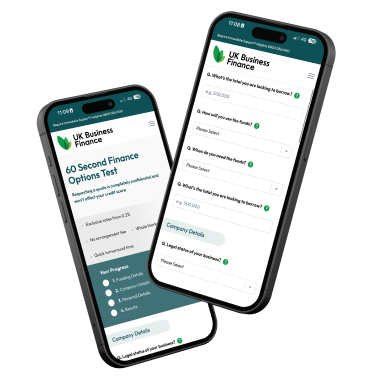Asset Finance
Finance for business assets, equipment and machinery
What is asset finance?
Asset finance helps businesses gain access to essential balance sheet assets without using up capital. It incorporates various forms of funding, including hire purchase and refinancing deals that preserve business capital and keeps cash flow stable.
UK Business Finance are commercial finance brokers and can offer quotes for asset finance. We know the criteria set by all asset financiers in the UK and will guide you towards the best deals for your business.
What type of asset can be funded through asset finance?
Asset funding is secured against a named asset or asset class and can either be used to purchase a new asset or refinance an existing one.
Hard assets
Including plant and machinery, vehicles, equipment, and buildings
Soft assets
Such as fixtures and fittings, office software, and CCTV equipment
How does asset finance work?
Lending is typically repaid over several years, making this an attractive medium-term borrowing option. If the borrower is unable to meet the repayments, the lender can seize the asset to recover their funds.
Whether a new asset is purchased or an existing asset refinanced, the mechanics of asset financing mean that repayments are fixed for a set term. Although the structure of asset finance products may differ the outcome for the business is stable cash flow and easier budgeting.
A consideration as the asset is secured is that restrictions apply if the business wants to sell or otherwise dispose of it. The lender must be informed before a sale, and the outstanding balance repaid in full by the borrowing company.
Different types of asset finance
Various forms of asset finance exist, including but not limited to:
Hire Purchase
Hire purchase involves paying a deposit followed by monthly instalments – typically for up to six years. The company is responsible for maintaining and insuring the asset, and at the end of the hire purchase agreement, may assume full ownership.
Equipment leasing
Equipment leasing allows a business full use of an asset, which is essentially rented from the financier. There is generally some flexibility at the end of a finance lease, and the borrower may be able to extend the lease for a further period, upgrade the equipment under a new lease, purchase the piece of equipment, or hand it back if it is no longer needed.
Asset refinance
Wholly owning expensive assets can tie up valuable capital but with asset refinancing an existing asset can be sold to a financier and then rented back. This results in an injection of cash as the capital locked within the asset is released, plus fixed equipment rental payments each month to the asset funder.
Operating lease
Operating leases, sometimes known as contract hires, are similar to finance leases but under an operating lease, the financier is responsible for maintaining the asset. This type of lease arrangement is typically short-term and means that the borrower will not become the owner of the asset at the end of the agreement.
What are the advantages of asset finance?
Spreads the cost of expensive items
Asset finance arrangements protect cash flow by spreading the cost of hard and soft assets. Payments are fixed, which also provides some certainty when budgeting and planning.
Protects business capital
Capital is protected and can be used for other projects or growth strategies.
Flexible form of borrowing
Asset funding is flexible and can offer various options at the end of an arrangement – extending a lease, for example, or taking ownership at the end of a hire purchase agreement.
How to apply for asset finance
You need to compare deals across the whole of the asset finance market to find the best one for you. UK Business Finance can offer free no-obligation quotes for this type of financing, and write your application on your behalf.
Top Finance Tips
We work across a wide range of sectors throughout the UK, providing specialist advice to each sector.

How to financially prepare for investor exits
Whether your business is at an early stage or it’s more established, the financial boost provided by external investment, such as from private equity firms, angel investors, and venture capitalists, is invaluable.

How to finance a MBO
If you’re considering conducting a management buyout (MBO), there are various means by which you can fund it. Financing commonly involves a level of personal funding by individual members of the management team combined with additional external borrowing, such as bank loans and asset financing.

What lenders look for in a business loan application
Knowing what lenders look for in a business loan application helps you present your business in the best light – an important consideration, as being rejected for a loan damages your company’s credit rating and makes it difficult to borrow in the future.

What is a commercial finance broker?
A commercial finance broker is a professional intermediary who helps business owners to source the best lenders and deals. They provide a vital service that eases access to funding and ensures businesses obtain the most appropriate finance for their needs.




